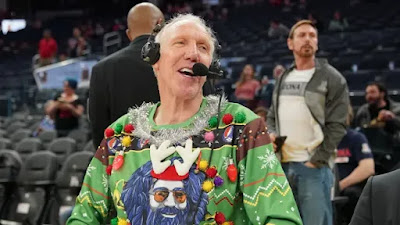 |
| Bill Walton in the background of Ghostbusters, grinning like he’s calling Cal / Stanford in the Pac-12 Tournament quarterfinals. |
Bill Walton was a basketball player, first, though perhaps not foremost, a winner of two NCAA titles with UCLA and two NBA titles, one with Portland, one with Boston, revolutionizing the position of center with his agility and dexterity and forecasting a slew of so-called NBA unicorns to come. In truth, Walton as a basketball player is mostly lost to me. Though I must have seen him play in his final years with the Boston Celtics in the mid-80s, I have no memory of it, learning about him more from David Halberstam’s essential “The Breaks of the Game” and in back issues of Sports Illustrated. The latter deemed his performance in the 1973 NCAA Championship Game where he scored 44 points by sinking 21 of 22 shots and snaring 13 rebounds as a slight case of being superhuman. That single missed shot always felt to me less unfortunate than cosmically fitting, a winking nod to human fallibility. Indeed, Walton’s body would prove fallible too as he struggled to stay healthy in his professional career amid problems with his back, hands, feet, ankles, what have you got.
Walton was not just a revolutionary where basketball was concerned. He conscientiously objected to playing on the 1972 Summer Olympics American Basketball team in protest of the Vietnam War, was friends with the radical sports activist Jack Scott (which is how Walton became slightly entangled in the Patty Hearst saga), and became the face of anti-war dissent at UCLA, even getting arrested for occupying a campus administration building. Eventually, in the later years of his sportscasting career, he would settle in the public imagination as a loveable bohemian in tie-dye and sunglasses flashing courtside peace symbols. It was safer and easier to think of him that way, after all, than as a full-bore radical, but flashes of his leftist belief system would still occasionally emerge.
I first got to know Walton through that second act sportscasting career after his chronic injuries forced him to retire from playing the game. Irreverent and unmerciful, he was tailor-made for the role. What I remember most about Shaquille O’Neal setting the NCAA Tournament record for blocks in a game in 1992 is less Shaq’s 11 rejections than Walton not praising his fellow big man but excoriating him for blocking the shots out of bounds rather than keeping them in play to provide his team a chance in transition. That kind of contrarianism was not just limited to his analysis but his whole broadcasting style, eschewing the medium’s preferred concise sentences for extravagant run-ons instead, and dropping myriad cultural and literary references that frequently left his announcing partners scratching their heads. He once quoted Lewis Carroll from Alice’s Adventures in Wonderland by deeming an NBA playoff series as curiouser and curiouser, a line I have only ever been able to hear in Walton’s voice ever after.
If Walton’s wrecked body forced him out of basketball, it eventually forced him out of broadcasting too, leading to a mind-bending dark period in his life where, as he wrote in his autobiography, the pain was so unyielding and unbearable that life was virtually unlivable, often leaving him lying on the floor for days at a time, contemplating suicide. A 2009 spine surgery, though, saved his life by ending his suffering. In returning to television by broadcasting Pac-12 college basketball games for ESPN, it wasn’t that a new Bill Walton emerged so much as he ceased playing the role of a sports commentator and just started commentating as himself. He did not expound on the games in front of him so much as he effused good vibrations, a little like being in the company of Alec Baldwin’s character on “Friends” if that character had been a Deadhead. Walton always espoused a hippie ethos, but it took on a whole new context in the wake of his physical salvation, transforming each game he called into a two-hour fount of loquacious gratitude.
Though Walton seemed generally beloved by the end of his life, this style of commentary had its detractors, criticizing him for focusing as much on flights of fancy as on the game and the players. There was some truth in this, but it’s also true that people who talk about sports for a living tend to live in a “small, constricted world” to quote Defector’s Ray Ratto talking about the glorious time in 2021 when Walton predicted five teams would advance to the Final Four. Walton’s worldview was always bigger than predictions, statistics, and takes, and post-spinal surgery, it became infinite. To him, each and every basketball game was a celebration of life, and in his later years, each and every broadcast of a basketball game was too.
Bill Walton died on Monday May 27, 2024, from cancer. He was 71 but will live forever among the California stars.
*Maybe this has no place in someone else’s obituary, but given his wandering tendencies, I think Walton would have wanted me to tell it: That is, I once slept overnight in my car in Temecula. The next morning at dawn I drove to Oceanside, parked near the beach, and watched the surfers do their thing in a grey, overcast Pacific while I drank a cup of gas station coffee. It is one of my happiest memories. Maybe there really was something about the dirt in Temecula.





No comments:
Post a Comment